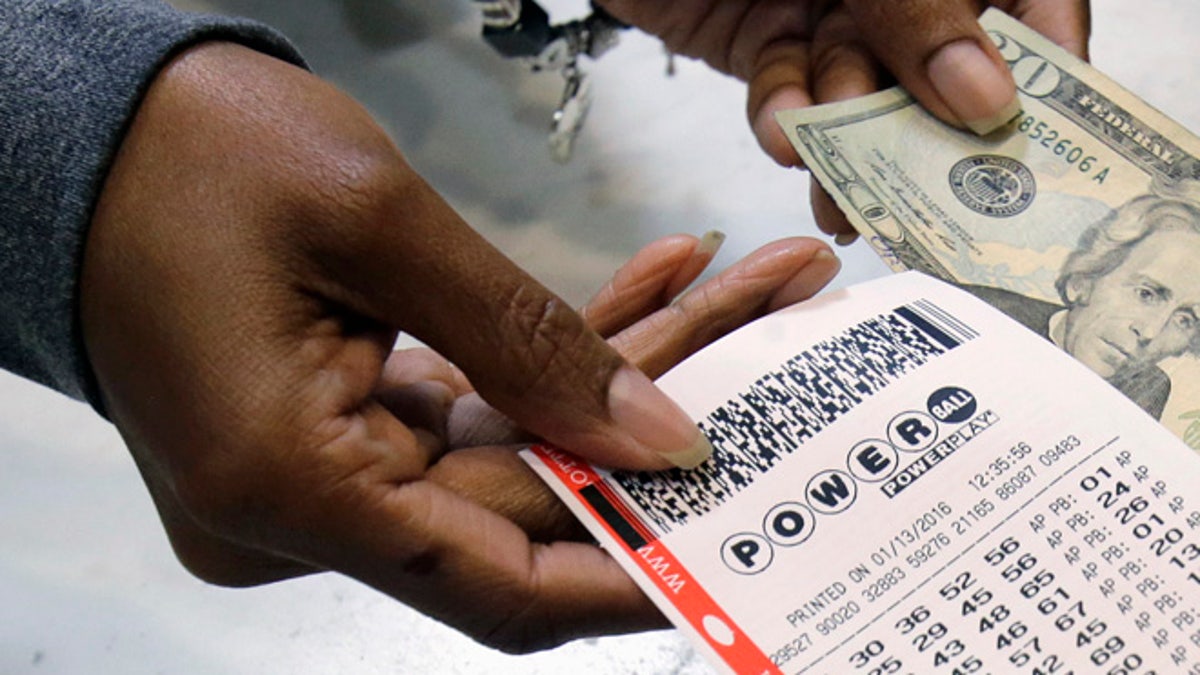
In this Jan. 13, 2016 file photo, a clerk hands over a Powerball ticket for cash at Tower City Lottery Stop in Cleveland. Powerball estimates that its jackpot for the May 4, 2016 (AP)
DES MOINES, Iowa – The Powerball jackpot has climbed to $415 million, making it the largest since a record-setting prize in January.
Winning numbers for the game will be drawn Saturday night, and if no one has the lucky ticket, the prize will likely grow substantially by the next drawing Wednesday.
Although $415 million is nothing to turn your nose up at, it's far smaller than the largest-ever $1.6 billion jackpot that prompted some to wait in hours-long lines outside lottery retailers. Three people bought winning tickets for that prize in January.
Powerball is played in 44 states plus Washington, D.C., Puerto Rico and the U.S. Virgin Islands. The odds of winning are one in 292.2 million.
The Powerball jackpot has climbed to $415 million, making Saturday night's prize the largest since a record $1.6 billion payout in January. Interest and sales typically spike when the lack of a winner causes prizes to spiral upward. Here are some things to keep in mind about Saturday's drawing and future jackpots.
HOW DOES POWERBALL WORK?
Drawings are at 10:59 p.m. Eastern time on Wednesdays and Saturdays, when five of 69 white balls are drawn from a drum, along with one of 26 red balls from another drum. Match all the numbers and you're suddenly very wealthy. Smaller prizes are paid if you match the Powerball or at least three of the white balls. The jackpot starts at $40 million and increases until there is a winner. Each ticket costs $2, and players can pay an extra $1 to increase the smaller prizes they might win.
IMPROVING THE ODDS
With high hopes, people often buy 25, 100 or more tickets, or they might join an office pool. They're right that buying more tickets increases their chance of winning, but not by much. To really increase your odds, you'd need to buy hundreds of thousands or millions of combinations, and even then you'd probably lose.
PICK YOUR PRIZE
Jackpot winners face a choice of taking a lump sum or an annuity paid over 30 years. The annuity is the amount promoted as the jackpot, but most winners opt for cash — which, as of Friday morning, is an impressive but much smaller $269.7 million. Most winners think they can earn a higher investment return than would be guaranteed through the annuity. But don't forget about taxes, which will eat up about half of the cash winnings and a bit less of the annuity.
LONG LINES
Powerball is sold in 44 states, plus Washington, D.C., Puerto Rico and the U.S. Virgin Islands. That leaves Alabama, Alaska, Hawaii, Mississippi, Nevada and Utah as the only states that don't participate. Typically, the busiest retailers and longest lines are found just across the border from states in the Lower 48 that don't offer the game.

